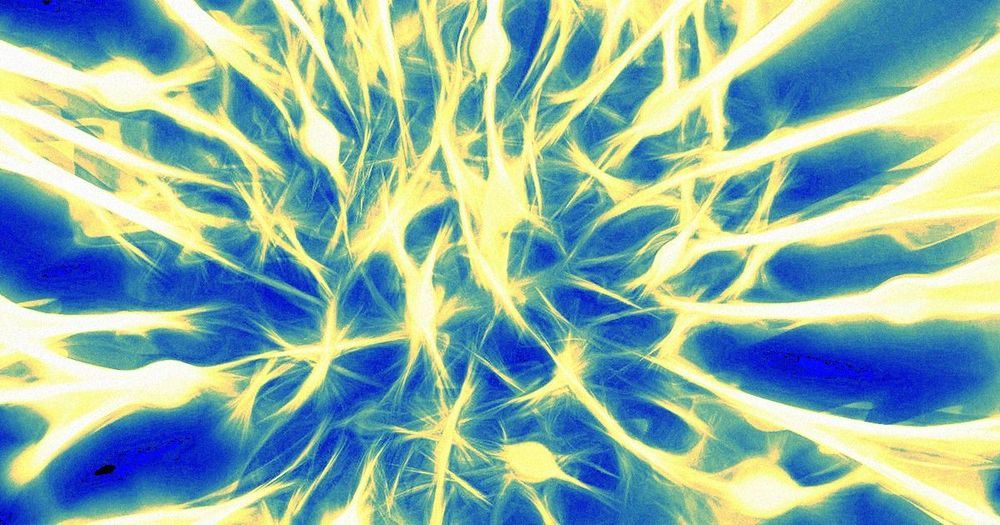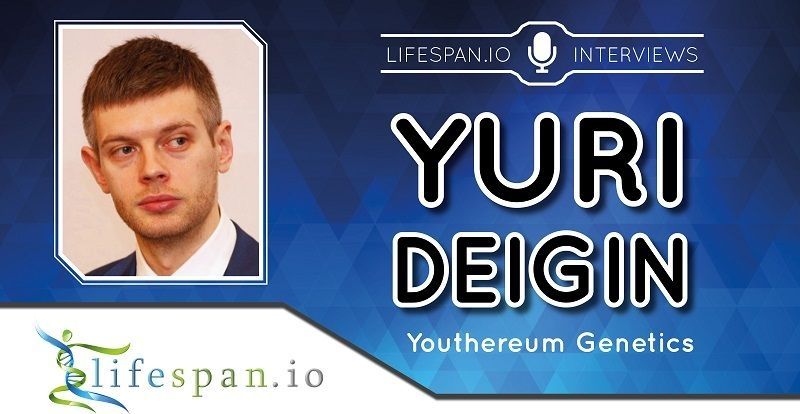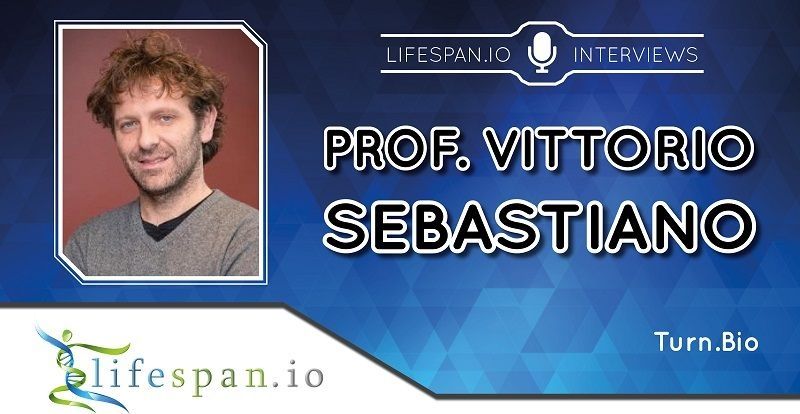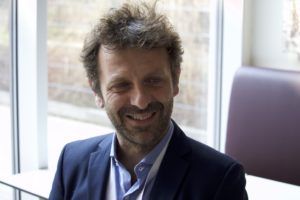Archive for the ‘life extension’ category: Page 408
Apr 5, 2019
“The Mice Became Smarter”: New Treatment Restores Aging Brains
Posted by Quinn Sena in categories: biotech/medical, life extension, neuroscience
Scientists at Stanford University say they’ve devised antibodies that block a specific gene related to brain aging — and that it’s giving old mice the cognitive prowess of younger ones.
“The mice became smarter,” senior author Tony Wyss-Coray said in a statement. “Blocking [the gene] CD22 on their microglia restored their cognitive function to the level of younger mice. CD22 is a new target we think can be exploited for treatment of neurodegenerative diseases.”
Apr 5, 2019
Can human mortality be hacked?
Posted by Paul Battista in categories: bioengineering, biotech/medical, life extension, nanotechnology, robotics/AI, transhumanism
A fringe group of scientists and tech moguls think they’re closing in on the fountain of youth. Here’s everything you need to know:
What is biohacking? Silicon Valley is built on the idea that technology can optimize, or “hack,” any aspect of our lives — so why not the human life span? Until recently, anyone hawking pills or treatments that promised to restore youthfulness was considered a quack, yet a growing number of “transhumanists” are convinced that, in time, human beings can be transformed through bioengineering, and that aging will be curable just like any other malady.
In light of rapid gains in gene editing, nanotechnology, and robotics, some futurists expect this generation’s biohackers to double their life spans. Aubrey de Grey, a regenerative medicine researcher backed by tech mogul Peter Thiel, insists that someone alive today will live to be 1,000. “It’s extraordinary to me that it’s such an incendiary claim,” de Grey says. Korean physician and financier Joon Yun has offered two $500,000 prizes to anyone who can restore a test animal’s youthful heart rate and extend its lifespan by 50 percent. For humans, the mortality rate at age 20 is 0.001 percent, Yun figures, “so if you could maintain the homeostatic capacity of that age throughout your life, your average life span would be 1,000.”
Apr 5, 2019
An Interview with Yuri Deigin of Youthereum Genetics
Posted by Steve Hill in categories: biotech/medical, genetics, life extension
At the Undoing Aging 2019 conference, we had the opportunity to interview Yuri Deigin, the CEO of Youthereum Genetics. His company is developing therapies that focus on OSKM, the Yamanaka factors known for turning cells back into a pluripotent state. By partially reprogramming cells using a single component of OSKM, Oct4, the company hopes to remove epigenetic aging from cells while still allowing them to retain their normal functions.
Do you think epigenetic alterations are a cause or a consequence of aging, and why?
Well, this question has so many different parts that need to be addressed. Of course, there are alterations that are consequences. Some of the epigenetics are consequences of aging, like epigenetic drift, with things that aren’t methylated in cells, as they divide throughout the lifetime, that methylation seems to get diluted away with subsequent divisions, but other parts of the genome, many of the epigenetic changes that happen that we can track throughout the aging of an organism are definitely not consequences of aging; they’re actually, from what I understand, causes of aging or causes in the change of metabolism and change of homeostasis, change how the organism behaves, essentially, that are driven by some high program in animal development, that basically silences some genes and activates other genes.
Apr 4, 2019
Quantum Immortality: Does Quantum Physics Imply You Are Immortal?
Posted by Quinn Sena in categories: alien life, life extension, quantum physics
What other ramifications to follow? Your subjective quantum immortality coupled with soon-to-be discovered indefinite life extension at the civilizational level would spell out that YOU ARE ACTUALLY TO LIVE FOREVER! One can also see a viable resolution to the so-called ‘Mind-uploading’, or Star Trek ‘Teleporter dilemma’, questioning whether in those instances you create a copy of yourself but kill yourself in the process. By analogy to the previous deliberations, it follows that your consciousness has to “migrate” to your living self, thus making the case for successful consciousness transfer in both methods of disembodiments.
On this note, my friend, I’d like to conclude and profess that you are to live forever as an individuated evolving consciousness in this illusory Matrix-like universe where nothing is what it seems.
-by Alex Vikoulov, futurist, digital philosopher.
Continue reading “Quantum Immortality: Does Quantum Physics Imply You Are Immortal?” »
Apr 4, 2019
Anti-Aging Discovery Could Lead to Restorative Skin Treatments
Posted by Genevieve Klien in category: life extension
Loss of collagen protein depletes renewal cells that serve as skin’s fountain of youth.
- By Dana G. Smith on April 4, 2019
Apr 4, 2019
Mushrooms Are A Highly Evolved Extraterrestrial Species — Organic Internet [VIDEO]
Posted by Quinn Sena in categories: alien life, genetics, internet, life extension, robotics/AI

It is a crazy thought, right?! To think that mushrooms could be alien life. But before you dismiss the idea, take a look at some of principles of the theory. The main concept was formulated by the ingenious psychonaut philosopher Terrence McKenna, and goes along following lines.
Like no other form of life on our planet, the spores of mushrooms are almost perfectly suited to space travel. They can survive high vacuum and insanely low temperatures; the casing of a spore is one of the most electron dense materials in nature, to the point where McKenna says it is almost akin to a metal; global currents are even able to form on the quasi-metallic surface of an airborne spore, which then acts as a repellent to the extreme radiation of space. It is a mind boggling thought that something could evolve to be so perfectly suited to explore the universe.
Apr 4, 2019
An Interview with Prof. Vittorio Sebastiano of Turn.Bio
Posted by Steve Hill in categories: biotech/medical, genetics, life extension
We recently attended the Undoing Aging Conference in Berlin and had the opportunity to interview Professor Vittorio Sebastiano of Turn. Bio, a company developing partial cellular reprogramming techniques to reverse cellular aging.
As we age, our cells experience changes to their epigenetic markers, and this, in turn, changes gene expression, which is proposed to be a primary reason we age. Recently, there has been considerable interest in resetting these epigenetic markers to reverse cellular aging; induced pluripotent stem cell (iPSC) creation uses similar techniques.
Continue reading “An Interview with Prof. Vittorio Sebastiano of Turn.Bio” »
Apr 4, 2019
Experts predict that we’ll be able to live up to 20% longer over the next 100 years. Here’s how humans are trying to live forever
Posted by Paul Battista in categories: biotech/medical, life extension
Following is a transcript of the video.
The truth is, you’re going to die. We all are. That’s because unlike whooping cough or strep throat, death has no cure. But thanks to the latest medical breakthroughs we’re closer than ever to finding one. In fact, some experts predict that we’ll be able to live up to 20% longer over the next 100 years. That means children today might live until they’re 145 years old. And what about immortality? Well, even that’s not out of the question.
History is littered with unusual attempts to defy death. In 1920, for example, a Russian scientist thought he could prolong life by sewing a piece of monkey testicle to a human’s. And even more shockingly, the idea caught on. At least 300 people underwent the procedure. Ouch.
Apr 3, 2019
An Interview with Dr. Judith Campisi
Posted by Steve Hill in categories: biotech/medical, life extension
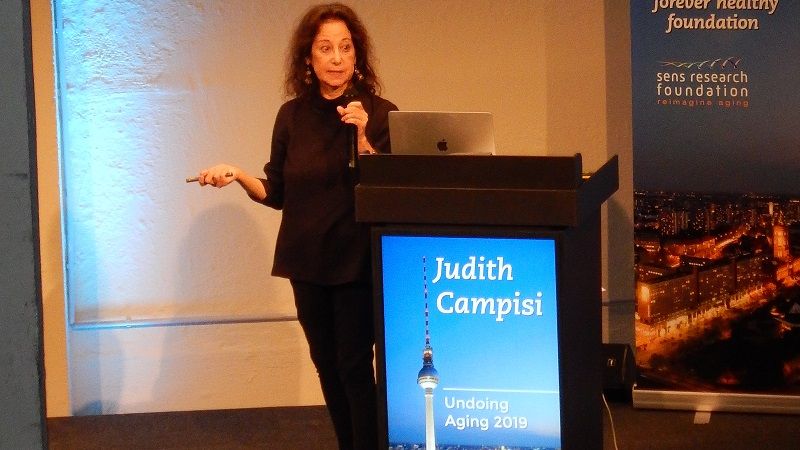
In this interview with Dr. Judith Campisi at Undoing Aging 2019, she talks about senolytics, immunotherapy, and other scientific topics.
At Undoing Aging 2019, we interviewed some of the best researchers who are involved in discovering therapies for the root causes of aging. Their research aims to ameliorate the damages of aging and may one day lead to a future without age-related diseases.

